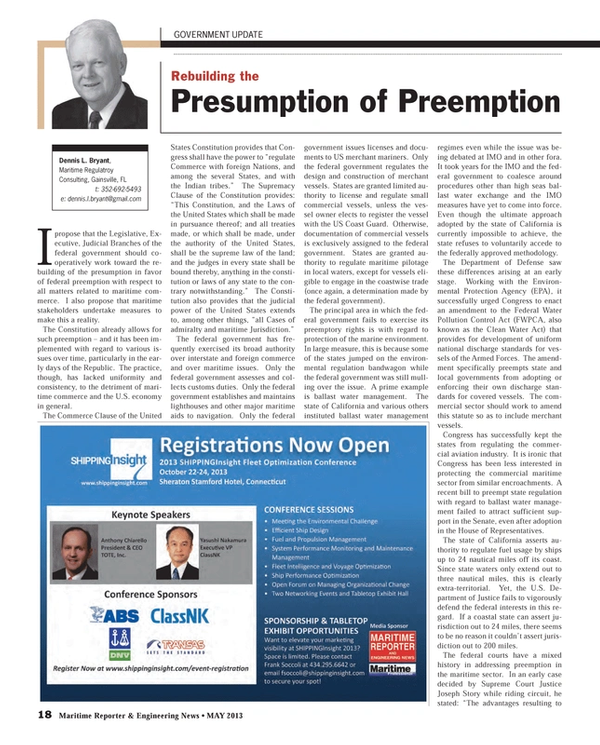
Rebuilding the Presumption of Preemption
I propose that the Legislative, Executive, Judicial Branches of the federal government should cooperatively work toward the rebuilding of the presumption in favor of federal preemption with respect to all matters related to maritime commerce. I also propose that maritime stakeholders undertake measures to make this a reality.
The Constitution already allows for such preemption – and it has been implemented with regard to various issues over time, particularly in the early days of the Republic. The practice, though, has lacked uniformity and consistency, to the detriment of maritime commerce and the U.S. economy in general.
The Commerce Clause of the United States Constitution provides that Congress shall have the power to “regulate Commerce with foreign Nations, and among the several States, and with the Indian tribes.” The Supremacy Clause of the Constitution provides: “This Constitution, and the Laws of the United States which shall be made in pursuance thereof; and all treaties made, or which shall be made, under the authority of the United States, shall be the supreme law of the land; and the judges in every state shall be bound thereby, anything in the constitution or laws of any state to the contrary notwithstanding.” The Constitution also provides that the judicial power of the United States extends to, among other things, “all Cases of admiralty and maritime Jurisdiction.”
The federal government has frequently exercised its broad authority over interstate and foreign commerce and over maritime issues. Only the federal government assesses and collects customs duties. Only the federal government establishes and maintains lighthouses and other major maritime aids to navigation. Only the federal government issues licenses and documents to US merchant mariners. Only the federal government regulates the design and construction of merchant vessels. States are granted limited authority to license and regulate small commercial vessels, unless the vessel owner elects to register the vessel with the US Coast Guard. Otherwise, documentation of commercial vessels is exclusively assigned to the federal government. States are granted authority to regulate maritime pilotage in local waters, except for vessels eligible to engage in the coastwise trade (once again, a determination made by the federal government).
The principal area in which the federal government fails to exercise its preemptory rights is with regard to protection of the marine environment. In large measure, this is because some of the states jumped on the environmental regulation bandwagon while the federal government was still mulling over the issue. A prime example is ballast water management. The state of California and various others instituted ballast water management regimes even while the issue was being debated at IMO and in other fora. It took years for the IMO and the federal government to coalesce around procedures other than high seas ballast water exchange and the IMO measures have yet to come into force. Even though the ultimate approach adopted by the state of California is currently impossible to achieve, the state refuses to voluntarily accede to the federally approved methodology.
The Department of Defense saw these differences arising at an early stage. Working with the Environmental Protection Agency (EPA), it successfully urged Congress to enact an amendment to the Federal Water Pollution Control Act (FWPCA, also known as the Clean Water Act) that provides for development of uniform national discharge standards for vessels of the Armed Forces. The amendment specifically preempts state and local governments from adopting or enforcing their own discharge standards for covered vessels. The commercial sector should work to amend this statute so as to include merchant vessels.
Congress has successfully kept the states from regulating the commercial aviation industry. It is ironic that Congress has been less interested in protecting the commercial maritime sector from similar encroachments. A recent bill to preempt state regulation with regard to ballast water management failed to attract sufficient support in the Senate, even after adoption in the House of Representatives.
The state of California asserts authority to regulate fuel usage by ships up to 24 nautical miles off its coast. Since state waters only extend out to three nautical miles, this is clearly extra-territorial. Yet, the U.S. Department of Justice fails to vigorously defend the federal interests in this regard. If a coastal state can assert jurisdiction out to 24 miles, there seems to be no reason it couldn’t assert jurisdiction out to 200 miles.
The federal courts have a mixed history in addressing preemption in the maritime sector. In an early case decided by Supreme Court Justice Joseph Story while riding circuit, he stated: “The advantages resulting to the commerce and navigation of the United States, from a uniformity of rules and decisions in all maritime questions, authorize us to believe that national policy, as well as judicial logic, require the clause of the Constitution to be construed as to embrace all maritime contracts, torts, and injuries, or, in other words, to embrace all those causes which originally and inherently belonged to the admiralty before any statutable restriction.” DeLovio v. Boit, 7 Fed.Cas. 418 (C.C.D.Mass. 1815). That case concerned whether a contract for marine insurance was controlled by state law or federal law. Justice Story emphatically ruled in favor of federal admiralty and maritime jurisdiction.
The issue of the extent of the federal power over foreign and interstate commerce as applied to maritime navigation reached the U.S. Supreme Court several years later. The state of New York had granted exclusive rights for the operation of mechanically-powered ships in its waters to the company founded by Robert Fulton. A competing company brought suit. After losing in New York state court, the competitor appealed to the US Supreme Court. In striking down the state decision, the court stated in pertinent part: “If, as has always been understood, the sovereignty of Congress, though limited to specified objects, is plenary as to those objects, the power over commerce with foreign nations and among the several states is vested in Congress as absolutely as it would be in a single government, having in its constitution the same restrictions on the exercise of the power as are found in the Constitution of the United States.” Gibbons v. Ogden, 22 U.S. 1 (1824).
In 1959, the Supreme Court struck down an Illinois statute that required certain rear fender mudguards on trucks and trailers operated on its highways as constituting an unreasonable burden on interstate commerce. Yet in 1960, it upheld the Detroit Smoke Abatement Code as applied to a ship engaged in interstate commerce while docked at a pier within the city. In the latter case, the court ruled that the Detroit code was an even-handed exercise of police power in an area where the federal government had not exercised its authority. Where the federal government has pervasively exercised its authority with respect to the design, construction, and operation of commercial vessels, the court has ruled that the concept of field preemption applies – that the federal government has adopted such a body of regulation that there is no room left for states to exercise any authority. It can reasonably be asserted that the federal government has now established an extensive and detailed body of law with regard to marine environmental protection. Whatever gaps may have existed previously have now been closed. State regulation of maritime commerce should be the exception, rather than the rule, and it should be clearly and carefully circumscribed. As noted above, the federal government could adopt, if it so chose, a field preemption approach with regard to marine environmental protection matters and elsewhere. There has though, at least to date, been insufficient pressure on the legislative, executive, and judicial branches to adopt such a position. I contend that the time has come. I do not advocate that the marine industry should be unregulated, or even under-regulated. Rather, I contend that Justice Story was right when, almost 200 years ago, he advocated uniformity in the regulation of the maritime industry. Federal uniformity has been allowed to erode over time. The rebuilding effort must begin now.
Dennis L. Bryant,
Maritime Regulatroy
Consulting, Gainsville, FL
t: 352-692-5493
e: [email protected]
(As published in the May 2013 edition of Maritime Reporter & Engineering News - www.marinelink.com)
Read Rebuilding the Presumption of Preemption in Pdf, Flash or Html5 edition of May 2013 Maritime Reporter
Other stories from May 2013 issue
Content
- New Scripps RV Honors Sally Ride page: 10
- Escort Tugs in San Francisco Bay page: 12
- Jumping Off the Fiscal Cliff? page: 14
- Rebuilding the Presumption of Preemption page: 18
- Get on Board with Shipyard Electrical Safety page: 20
- Crew System Integration on RHIBs and High Speed Craft page: 22
- BWT CASE STUDY: Hyde, PG & OSVs page: 30
- Bergen: A Unique Maritime Environment page: 32
- Unconventional Wisdom from Dolphin Geophysical CEO page: 36
- Grieg Star & DNV’s Crane Collaboration page: 38
- NES Powers Up in Competitive Market page: 39
- Atlantic Offshore and Ocean Response page: 39
- A Billion to One Shot page: 40
- Rolls-Royce has a Gas with Bergen Engines page: 41
- Açu Superport: A Modern Port Concept for Brazil page: 42
- Volvo Penta Targets Marine for Growth page: 46
- Realistic Engine Simulation page: 48
- In Big Ship Fuel Economy, Finances Trump Regulation page: 54
- Portable Oil Analysis Instruments page: 56
- Reusable Oil Filter Technology page: 58
- New Product: Parker's icountBSplus page: 59
- LNG Tech on tap at Europort 2013 page: 60
- Control Systems on LCC 20 Saves Fuel, Reduces Workload page: 71
- Titan Refloats Grounded Vessel page: 72


